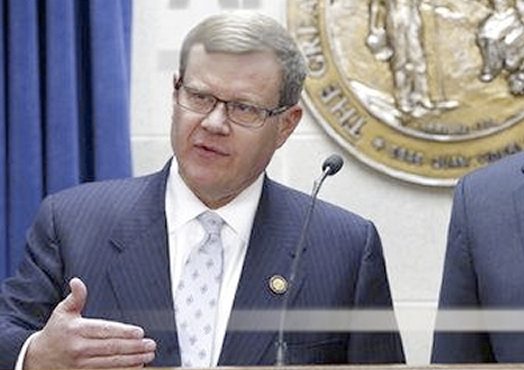

RALEIGH (AP) — The North Carolina General Assembly won’t advance legislation this year preventing transgender girls and women from competing in school sports labeled for biologically female athletes, a top legislative leader said. “The House will not be taking up that bill,” House Speaker Tim Moore told The Associated Press in an interview. “We’ve spoken with the bill sponsors and others and simply believe that there’s not a need to take it up at this time.” The inaction marks another decision by state Republicans to step away for now from controversial LGBT legislation rather than face criticism that GOP leaders in other states have experienced. Those actions, however, have failed to generate broader backlash. Senate leader Phil Berger’s office said last week that there would be no votes on a bill that sought to limit medical treatments for transgender people under 21 and punish doctors who facilitate that treatment, adding that there was no pathway for it to become law. The House is setting aside the “Save Women’s Sports Act,” which was pushed by social conservatives and other groups who said young women were in danger of losing spots on high school and colleges teams and sports titles to athletes who were born male, creating inherent unfairness. LGBT-rights groups strongly opposed the legislation. Parents and children told a judiciary committee hearing this month that the prohibition would harm transgender girls who want to fit in and would amount to discrimination. No similar bill was filed in the Senate this year. Moore expressed skepticism that the sports bill would have had enough votes to be adopted into law. Vetoes by Democratic Gov. Roy Cooper, an LGBT rights supporter, are tough for Republicans to override because their majorities aren’t veto-proof. Moore called the transgender sports bill a solution in search of a problem that hasn’t yet surfaced in North Carolina as in other states. Since 2019, the North Carolina High School Athletic Association has received less than 10 requests from teenagers who identify as a different gender than on their birth certificate and seek to participate in formal athletics. “We’re not really hearing any complaints about that where it’s an issue,” Moore told the AP late Wednesday. Moore moved the transgender sports bill from the Judiciary Committee to the Rules Committee, where measures that the majority party doesn’t want to take up often get sent to die. That action happened Monday, the same day Apple Inc. announced the construction of its first East Coast campus in the Raleigh-Durham area and the creation of at least 3,000 jobs over the next decade. Berger and Moore told reporters at a Monday news conference celebrating the Apple expansion that the company demanded no actions on legislation. Cooper did say that Apple CEO Tim Cook told him the repeal of North Carolina’s 2016 transgender bathroom bill was “important in their decision making,” as was the recent end of a moratorium on local government nondiscrimination ordinances. Moore told the AP that parking the transgender sports bill had no connection to the Apple announcement. Rather, he said, the decision was the result of discussions within the House Republican Caucus. Rep. Mark Brody, a Union County Republican and chief sponsor of the legislation, said Wednesday that he feels pretty confident the measure got derailed because “Apple’s come to town” but lacked hard evidence. Brody said the measure would have gone all the way to Cooper’s desk if House leadership had given the green light to vote on it, but a veto would have occurred. “I’m disappointed that it isn’t moving,” Brody said, adding that the conflict will resurface when a transgender girl wins a state championship in a sport designated for women. “I think the issues are not going to go away.”